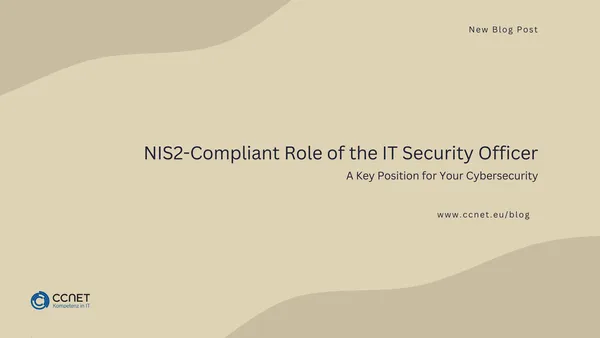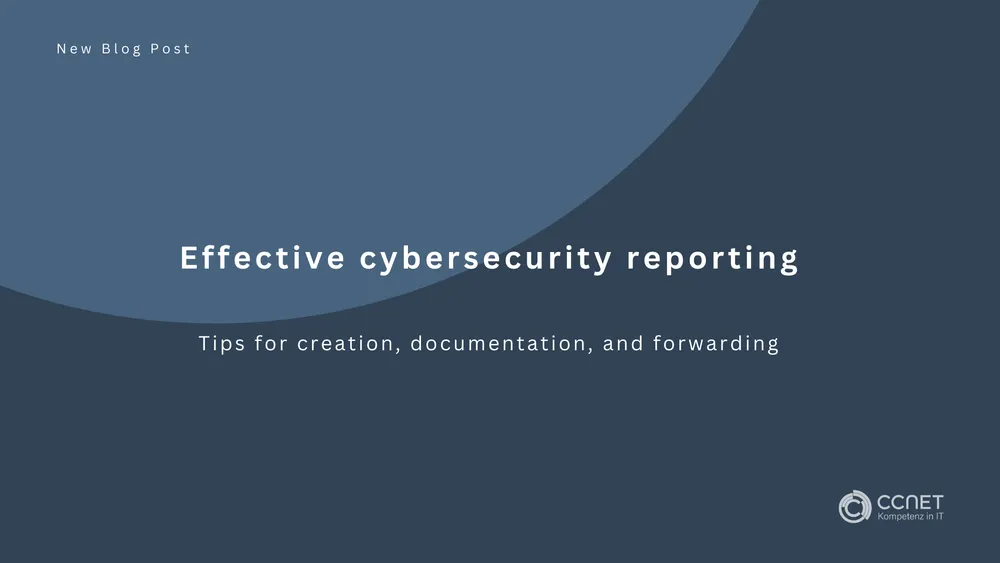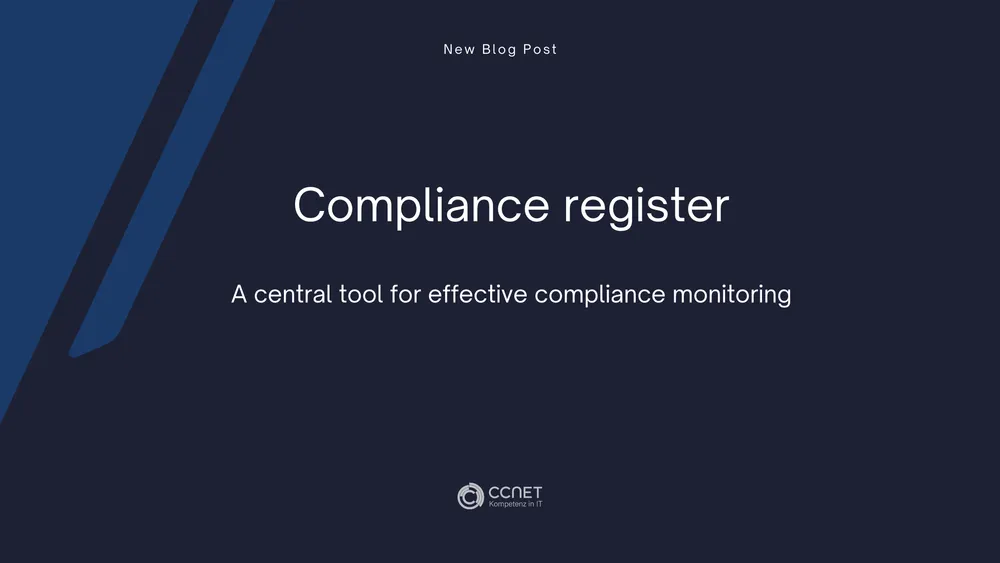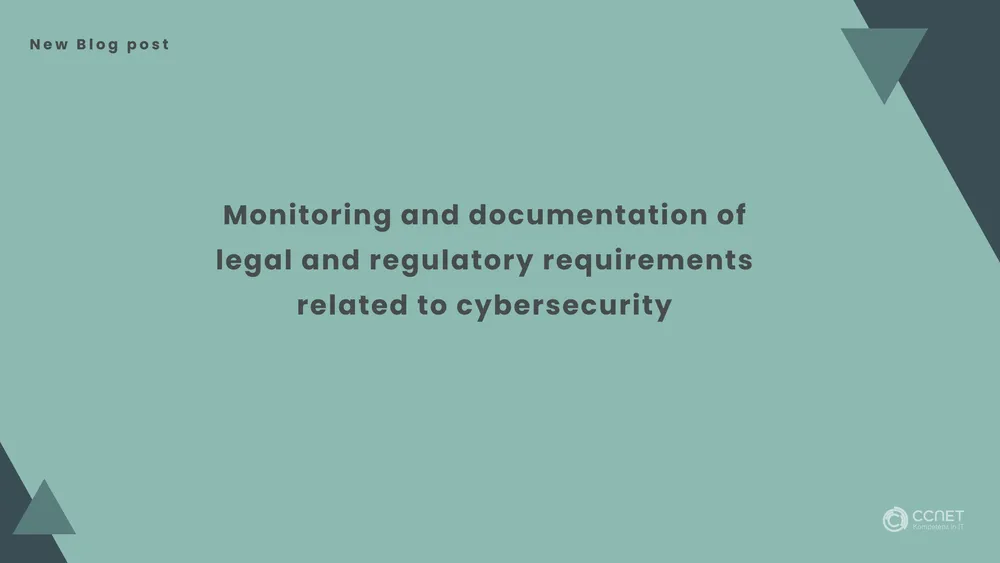
CCNet
Dec 6, 2024 • 3 min read

NIS2-Compliant Role of the IT Security Officer: A Key Position for Your Cybersecurity
Within the framework of the NIS2 Directive, the IT Security Officer plays a central role in ensuring the cybersecurity of a company. This position is crucial for identifying threats, minimizing risks, and ensuring the protection of IT infrastructure. In this post, we will explain how the tasks and responsibilities of the IT Security Officer are integrated into the governance and organizational structure and why this role is indispensable for NIS2 compliance.
Why the IT Security Officer is the Cornerstone of Cybersecurity
The security of a company's IT systems and sensitive data hinges on the effectiveness of the measures coordinated by the IT Security Officer. This position is not just an administrative role – it is the operational hub for all cybersecurity activities. The IT Security Officer develops the strategy, implements security policies, and ensures that all employees develop a deep understanding of the importance of cybersecurity.
By leading a dedicated cybersecurity team, the IT Security Officer is responsible for the continuous monitoring of security measures, conducting risk assessments, and planning emergency responses. The strategic position of the IT Security Officer ensures that technical and organizational measures work hand in hand, leaving no aspect of the company’s security to chance.
Key Responsibilities of the IT Security Officer
Under the NIS2 Directive, the IT Security Officer is the central figure in the company's security framework. The following responsibilities form the backbone of the cybersecurity strategy:
-
Development and Updating of the Cybersecurity Strategy: Continuous review and adjustment of the security strategy to current threats and regulatory requirements are essential. The IT Security Officer identifies best practices, implements security standards, and ensures that the strategy is always up to date.
-
Leadership of the Cybersecurity Team: As the leader of the cybersecurity team, the IT Security Officer coordinates the work of IT security analysts, network administrators, and external security specialists. Monthly meetings are held to analyze current threats and address security gaps. This collaboration is crucial for developing and implementing a cohesive security strategy.
-
Monitoring IT Security Measures: The IT Security Officer ensures that all security policies and controls are followed. They implement necessary measures and monitor their effectiveness to ensure the company complies with legal and regulatory requirements.
-
Risk Assessment and Threat Management: Regular risk assessments and threat analyses are necessary to identify potential vulnerabilities in the IT infrastructure. The IT Security Officer develops risk mitigation plans and ensures an effective response to security incidents.
-
Incident Response and Emergency Management: Leading the response to security incidents is one of the IT Security Officer's most critical tasks. By coordinating damage control and recovery measures, they ensure that the company responds quickly to incidents and minimizes their impact.
-
Training and Awareness: A key part of the security strategy is employee training. The IT Security Officer organizes awareness programs to heighten sensitivity to cyber risks and foster a security culture within the company. Every employee must understand the importance of cybersecurity for the company's success.
-
Reporting and Communication: Regular reports on the status of cybersecurity are essential to keep management and other relevant stakeholders informed. The IT Security Officer ensures clear communication of threats and security incidents and provides recommendations for improving security measures.
The Indispensable Role of the IT Security Officer within NIS2
The NIS2 Directive clearly states that companies need a well-structured cybersecurity strategy that is regularly reviewed and updated. The IT Security Officer is the central actor who ensures that all of the company’s IT systems and data are protected from cyber threats.
The role of the IT Security Officer goes far beyond implementing technical measures. They are a strategic partner to management, ensuring that the security strategy not only meets current requirements but is also proactively prepared for future challenges.
Requirements for the IT Security Officer
To meet the demands of the NIS2 Directive, the IT Security Officer must have extensive knowledge and skills:
-
Technical Expertise: The IT Security Officer should have solid knowledge in areas such as network security, threat management, and incident response. Certifications like CISSP or CISM are advantageous in demonstrating the necessary expertise.
-
Experience: At least five years of experience in IT security and proven success in developing and implementing security strategies are crucial.
-
Personal Skills: Leadership qualities, strong communication skills, and analytical thinking are essential for effectively leading the cybersecurity team and making strategic decisions.
Conclusion: The IT Security Officer – A Guarantee for Your IT Security
The position of IT Security Officer is indispensable for successfully developing and overseeing a company’s cybersecurity strategy. Through the clear structuring of tasks and close collaboration with management, the IT Security Officer ensures that your company not only meets the requirements of the NIS2 Directive but is also protected against cyber threats in the long term, making it NIS2-Compliant.
If you want to ensure that your IT security measures are at the highest level and that your organization is always protected, it is essential to fill this key position professionally and effectively. With the right person leading your cybersecurity strategy, you will be well-equipped to meet the current and future challenges of the digital world.


